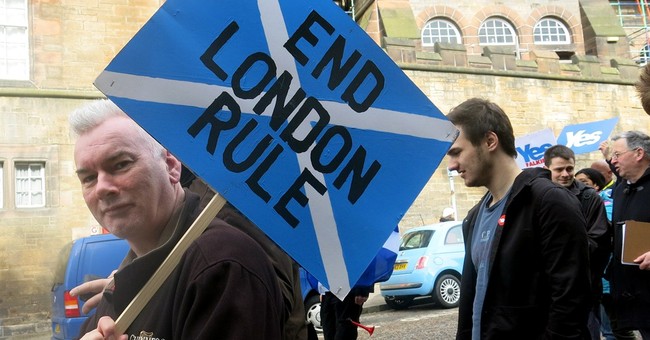
Posted on 08/28/2014 9:17:40 AM PDT by Kaslin

"The best laid schemes of mice and men often go awry." -- Scottish poet Robert Burns, "To a Mouse" (1786)
CAIRNRYAN, Scotland -- For Americans whose knowledge of this beautiful land is limited to kilts, whiskey, bagpipes and the film "Braveheart," the forthcoming referendum on whether Scotland should remain part of the United Kingdom or become an independent nation will come as a curiosity at best.
The primary objection of those favoring separation is the lack of self-determination granted to Scots by the British government. Though Westminster in recent months has devolved more powers to Edinburgh, those favoring separation say it is not enough. In the final debate Monday night before the September 18
vote (a turnout of 80 percent is predicted), the chairman of the "Better Together" campaign, Alistair Darling, engaged in the rhetorical equivalent of a heavyweight prizefight with Alex Salmond, first minister of Scotland.
Salmond was declared the winner of the debate, decisively defeating Darling on performance, despite numerous interruptions by both men. Darling mostly had the better of it on substance when he noted the uncertainty that would follow separation, especially over the currency that will be used, the debt Scotland could still owe Britain, lost revenue from North Sea oil and gas and "thousands" of jobs that might be lost if U.S. Trident submarines were forced to leave Scottish waters, since presently, the U.S. is allied firmly with Great Britain, who, after separation, would no longer hold sway over Scottish ports.
The referendum generally pits a younger liberal population in favor of separation against older, more conservative Scots. Listening to questions from the Glasgow audience in the nationally televised debate, I was struck by how much the ideological battles here resemble U.S. politics, especially when it comes to defense. The naive argument by one young man, who appeared no older than 30, that ridding Scotland of nuclear weapons will somehow make the country safer might make some liberals feel better in the short term, but it denies the reality of peace through strength and the superior argument that having nuclear weapons serves as a deterrent.
Salmond mentioned the aging and increasingly dysfunctional National Health Service and the thousands of Scots who have come to rely on it. He wondered whether they will become victims of budget cuts, privatization and austerity measures should Scotland remain part of the UK. He's right, of course. NHS is running in the red and cannot sustain itself, but parting ways with Britain won't fix that for Scotland, reports the Daily Mirror, and Salmond has no viable alternative to the NHS. Darling might have pointed this out to him, but he chose not to.
Another similarity with U.S. politics was the failure of both men to challenge the populace to rely less on government and more on themselves. "We can't go on like this" might not sit well with voters who have come to rely too much on government and as a result contributed to the national debt of both countries, but it is reality.
Polls taken before the final debate show the pro-separation side still trailing by 14 percent those who wish Scotland to remain part of Britain, but people are now paying attention. The loudest applause of the night came when Salmond closed with this line: "This is our time, it's our moment. Let us do it now."
Scottish independence would further weaken what remains of Britain's once great "empire." It could also seriously weaken Scotland, which could learn that unlike the young adult who leaves home unprepared and soon has to return, there may be no going back if Scotland leaves the "home" it has lived in for more than 300 years.
Thanks for the correction. You’re a much better British historian. I must have forgotten to much of what my pipe instructor tried to explain. So there were no Lowlanders engaged at New Orleans?
Independence from England worked out pretty well for us in the Colonies, but I don't think it's such a good idea for Scotland. If, on the night of September 18, I see a crowd of blue-faced, kilt-wearing, Scotch-inebriated, bagpipe-playing folks descending upon Hyde Park, I'll have a pretty good idea of how the vote went. Or maybe not -- bagpipes sound the same whether the pipers are drunk or sober.
“#1) I SUPPORT self determination, secession (heck our own US Declaration of Independence was based on these principles)”
You didn’t get the memo from Lincoln announcing that that policy is no longer operative?
The British Order of Battle at New Orleans included:
Infantry Regiments
4th Foot (King’s Own)
7th Foot (Royal Fusiliers)
21st Foot (Royal North British Fusiliers)
43rd Light Infantry (Monmouth)
44th Foot (East Essex)
85th Foot (Buck’s Volunteers)
93rd Foot (Argyll and Sutherland Highlanders)
95th Rifle Corps
1st West Indian Infantry (Colored)
2nd West Indian Infantry (Colored)
Cavalry Regiments
14th Dragoons (dismounted)
Detachments of:
Royal Artillery
Royal Engineers
Royal Rocket Corps
Royal Corps of Sappers and Miners
Sailors from the Royal Navy
Royal Marines
Of the regiments that fought at New Orleans, the 4th (King’s Own) and the 95th (Rifle Corps) went on to fight in June at Waterloo. The 93rd Foot (Argyll and Sutherland Highlanders) went on to form “The Thin Red Line” at Balaclava during the Crimean War. The 4th suffered three times as many casualties at New Orleans than they did at Waterloo, with over 400 killed or wounded. Overall British casualties numbered between 2,000 and 3,000, which included the commander, General Sir Edward Pakenham.
Just coincidentally, two popular cowboy/western songs were "The Battle of New Orleans" and "When Will You Meet Your Waterloo", (song history down the page). Hmm.
Disclaimer: Opinions posted on Free Republic are those of the individual posters and do not necessarily represent the opinion of Free Republic or its management. All materials posted herein are protected by copyright law and the exemption for fair use of copyrighted works.